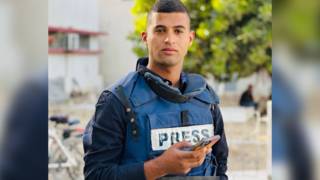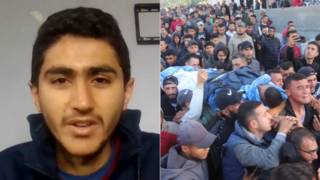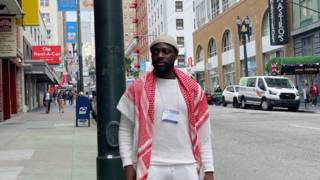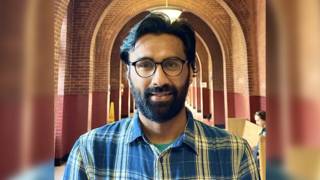
Guests
- Seth Freed Wessleraward-winning reporter for Colorlines.com and senior researcher at the Applied Research Center.
- Randy Parrazpresident of Citizens for a Better Arizona. The group led a successful recall effort against State Senator Russell Pearce, the leading lawmaker behind the anti-immigrant bill, SB 1070.
We get an update from Colorlines.com reporter Seth Freed Wessler about hearings Wednesday before the U.S. Supreme Court on Arizona’s notorious anti-immigrant law known as SB 1070. The case could have implications for a half-dozen other states that passed similar measures which are now on hold pending its outcome. “The question on the table in the court yesterday was what the states are allowed to do. But the question that lots of people have on the ground is, what’s Obama going to do?” says Wessler. “The administration has deported more people than ever before: 400,000 people.” Based on their line of questioning, justices across the ideological spectrum appeared reluctant to strike down the law. Should the court uphold any part of the law, civil rights groups plan to challenge it on grounds that it discriminates on the basis of race and ethnic background. “The bottom line: they don’t really understand the extent to which this law goes deeper and really impacts the lives of people who are living here, not just those who are undocumented, but those who have been here for three or four generations who are of Latino background, who are being stopped and harassed and detained,” says activist Randy Parraz of Citizens for a Better Arizona. [includes rush transcript]
Transcript
JUAN GONZÁLEZ: On Wednesday, the Supreme Court heard arguments in a closely watched case that challenges Arizona’s notorious anti-immigrant law. The case could have implications for a half-dozen other states that passed similar measures, which are now on hold pending the outcome of the court’s decision. The Obama administration has challenged four provisions of the law, known as Senate Bill 1070, for interfering with federal immigration enforcement.
Most of the hearing concerned the part of the law requiring state officials to check immigration status. Based on their line of questioning, justices across the ideological spectrum appeared reluctant to strike down the provision. Even Justice Sonia Sotomayor appeared to agree that states were entitled to enact such provisions. The justices seemed more divided, however, over three other provisions of the law, including one that makes it a crime for undocumented immigrants to work.
After listening to the oral arguments, Republican Governor Jan Brewer of Arizona said the justices seemed to side with her decision to sign Senate Bill 1070 into law.
GOV. JAN BREWER: I am. I’m very, very encouraged from what we all were able to view today and hear. I thought that the hearing went very, very, very well. I feel very confident, as I walked out of there, that we will get a favorable ruling in late June. I’m very, very impressive—impressed with the fact that they gave us extra time, something that we all know is very unusual. And that gave the significance of how important this ruling will be, not only to the state of Arizona, but certainly to the United States of America.
JUAN GONZÁLEZ: That was Republican Governor Jan Brewer of Arizona.
The Supreme Court’s ruling on Senate Bill 1070 is expected in June. Many legal analysts expect it will uphold parts of the law and strike down others. Should the Court uphold any part of the law, civil rights groups plan to challenge it from a different angle: that it discriminates on the basis of race and ethnic background.
Meanwhile, immigrant right activists held a number of protests and vigils across the country to coincide with yesterday’s hearing. In Phoenix, Arizona, hundreds of protesters blocked the entranceway to the Immigration and Customs Enforcement, or ICE, office.
PROTESTER: This is the only way that we could get the government and the public to see what we want.
JESSICA DAVENPORT: I believe affronts on human rights are something that affect us all. And I’m standing up for dignity and respect for all people.
AMY GOODMAN: At least nine people were arrested at the protest as they locked themselves down in the street in front of the immigration building and unfurled a banner that read: ”ICE Stop Deporting Arpaio’s Victims. Not One More. No SB 1070. No SComm. No Arpaio.” That’s a reference to Maricopa County Sheriff Joe Arpaio, who the Justice Department has accused of committing flagrant civil rights abuses against immigrants and people of color in Arizona.
For more, we’re joined by two people. Seth Wessler, award-winning reporter for Colorlines.com, he was in the Supreme Court yesterday covering the SB 1070 hearing, senior researcher at the Applied Research Center. And in Phoenix, Arizona, we’re joined by Randy Parraz. He is president of Citizens for a Better Arizona, the group that led a successful recall effort against State Senator Russell Pearce, the leading lawmaker behind SB 1070. Their sights are now set on Sheriff Arpaio, who faces reelection this fall.
We welcome you both to Democracy Now! Seth Wessler, tell us about what happened at the Supreme Court yesterday.
SETH FREED WESSLER: Well, it was a packed court yesterday. And the reality is that the government’s attorney left the court rather bruised yesterday. The justices, the eight of them that were there—Justice Kagan recused herself—asked a rather aggressive line of questions to the—to Donald Verrilli, the government’s attorney. Basically, the argument here is that the government says that Arizona and other states can’t try to pass their own immigration laws, that the government has the power to do that. And Arizona replies that they’re just trying to help the federal government do its job. What happened in court is that the justices seemed to buy Arizona’s argument. Essentially, Justice Roberts said, you know, “You can still make the decision. You, the federal government, still get to make the decision about who gets deported. This is still in your hands.” And Verrilli, the counsel for the government, responded, “But we haven’t authorized Arizona to act in this way.”
The reality is that the government is actually walking a pretty fine line. The federal government has rapidly expanded a set of programs that use local police to detain and deport non-citizens: Secure Communities and the 287(g) program. And the state of Arizona is arguing that they’re not doing anything that those programs don’t do. Even Justice Sotomayor, who was clearly the most sympathetic with the government’s claims, said that she found the government’s argument that somehow SB 1070 and Secure Communities and 287(g) are different. She found that argument, quote, “terribly confusing,” and asked Verrilli to come up with a different argument. It was as if she was trying to pull something out of him that he wasn’t ready to offer. The reality is that the government was unwilling to go into that other argument, which is that this law causes racial profiling. And the federal government, you know, took this suit as a pre-emption suit and refused to address the racial profiling issues. It was clear that everybody in the courtroom recognized that that’s one of the major issues at play here. And in avoiding it, the federal government seemed to set themselves up for this kind of pushback.
JUAN GONZÁLEZ: In other words, they basically saw it as a jurisdictional issue of who has the authority or the constitutional responsibility for the laws, rather than actually looking at the substance of how the law is affecting the people of Arizona.
SETH FREED WESSLER: That’s right.
JUAN GONZÁLEZ: What about the other arguments the government—because it challenged the law on a variety of issues. Did it get into the other arguments, as well?
SETH FREED WESSLER: Well, I mean, the basic argument here is about the power of the states, right? And so, the government was challenging a set of provisions in the law, the provision that—the sort of “show me your papers” provision that allows—that requires local police to ask people for their immigration status, a provision of the law that allows police to arrest undocumented immigrants without a warrant, a section of the law that makes it illegal for undocumented immigrants to work. And on all of these grounds, the federal government’s argument was that they have the power, and the state does not, to implement these bills. That was the basis of their argument. And the court was not buying it.
AMY GOODMAN: Randy Parraz, while Seth Wessler was inside observing the Supreme Court proceedings, you were outside with the major protest, and then you flew overnight to Phoenix, where there were also protests, where we’re speaking to you from. Your concern as president of Citizens for a Better Arizona?
RANDY PARRAZ: I mean, I think, especially being on the outside on the steps of the Supreme Court, it just seemed like there’s just two Americas. You had one particular protest and rally which was predominately all-white, a much older crowd of folks, speaking out there in support of SB 1070. Then you had the present and future of America, which is a multiracial, multiethnic, multilingual group of folks, ecumenical folks, who came together in opposition to SB 1070. So, basically, this is a battle—this is a fight over the future of America. This is about: are you going to have one set of rules that apply if you live in California, New York, or another set of rules that apply when you live in New Mexico or Arizona? It’s about, you know, really trying to see what’s going to be the test for folks, when we’re talking about—are we going to provide a pathway for young people to be educated and to apply their skills and not be penalized for behavior of their parents? Are we going to have just this different status of citizenship based on where you live in the United States of America? We’re supposed to be one country. So I think you see this fight playing out.
When Jan Brewer signed that law, she wasn’t really interested in, you know, securing the border or trying to be a leader in fighting this immigration issue. She was trying to get elected to maintain a position as governor. And the moment she signed that, all three or four of her other challengers in her primary dropped off. And so, that’s why Russell Pearce is so much credited for getting Jan Brewer reelected to be governor. So, I mean, the bottom line: they don’t really understand the extent to which this law goes deeper and really impacts the lives of people who are living here, not just those who are undocumented, but those who have been here for three or four generations who are of Latino background, who are being stopped and harassed and detained. And I think it’s just—we shouldn’t be surprised that the Supreme Court wasn’t willing to deal with those types of issues at this time. This is a very political issue.
JUAN GONZÁLEZ: And Randy, the impact still in Arizona today of the law, even though portions of it have been held up pending the decision of the court?
RANDY PARRAZ: Yeah, I mean, people have to understand that there was racial profiling taking place here in Arizona prior to this law being signed. What just totally just struck all of us is that then we had this—the signing and passage of this law pretty much made it legal, codified it and said, “Yeah, you can do that. You can act on your reasonable suspicions, no matter how you’ve been raised or how you’ve been trained. And if you think someone looks a certain way, then, all be it, yeah, detain them, stop them. If they don’t have their papers, then bring them in.” That’s what—that’s what this is really about.
It’s about a time with a growing—the largest, fastest-growing voter constituency group demographic in the state now is Latino. It’s the fastest—and so, it’s about power. It’s about what’s going to happen in this particular state when it comes to who’s going to be our representatives. So there’s much more than just—you know, why is this particular attack happening now? Why didn’t it happen in 2002 or 2004? Right? There’s certain things that are happening now that are—this convergence, have really allowed this type of attack to happen.
And it’s unfortunate that, you know, we had to turn to the Supreme Court to intervene. But what’s even worse is that we have a Congress that’s much more representative of America than the Supreme Court. Sure, they should be taking the action necessary to make sure we have some sort of uniformity of laws, especially when it comes to immigration. You know, this is not the United Counties of Arizona. We are not a country, right? Immigration impacts international law, international borders. And so, for us to sit back and say, “Oh, states’ rights.” Are you kidding me? Every state can do what they want on this particular issue? Oh, so if states want to go back and start having racial covenants when it comes to housing, or, “Hey, let’s just go segregate certain things” — it’s not just about—state rights have a limit. And so, I think now that—for them to put it out there again is like, is this just a throwback now to the '50s? Or—and when some states thought it was OK to have, you know—allow some people to vote and not others? Or allow certain gender to vote and not others? Or to have people go to school in certain places? So this is basically about having a country that's united in terms of its policy when it comes to how we deal with immigrants, right? And not to have—you know, if you’re undocumented, say, “Oh, I’m going to move to California, because they actually will allow me to go to school. Or I’m going to go to another state or New York or different places.” And surely, we don’t want policies coming up basically because, oh, there’s a Democrat majority in California or there’s a Republican majority in Arizona, so therefore we can have different laws, because that’s what they want in that particular state. I mean, surely we need to have more courageous leadership coming up from the President, from Congress and from the Supreme Court to kind of put some sanity into this debate.
JUAN GONZÁLEZ: And Randy, you’ve initiated a campaign, like you did against Russell Pearce, now against Joe Arpaio. The importance of that campaign and the role of Joe Arpaio in this debate on immigration?
RANDY PARRAZ: Yeah, it’s basically to show these elected officials that there is consequences to your behavior. Now, Russell Pearce—if SB 1070 is so popular in Arizona, why did he get recalled? Why, in a very conservative district, did 42 out of 51 precincts vote to recall Russell Pearce? The first time in the history of the United States that a sitting president was so extreme that he actually got recalled after only serving one year of his two-year term. So I think we need to really look at that. What we’re trying to show America is that Arizona is not a Tea Party state. There is a Tea Party minority. But when good people, whether Republican, Democrat and independent, stay quiet, complain on the sidelines and don’t get involved, you know, you have this really extreme right-wing tilt of your politics.
And so, I think—so, now our next step is to really hold Sheriff Arpaio accountable. We’re going to remove him from office. He’s been there now 20 years. He’s going to be 80 years old in June. It’s time for him to go. He’s a relic from the past. And his policies and the abusiveness that he’s done does not reflect the values of most people in Maricopa. I’ve been meeting with Republicans and Democrats, and they’re all saying it’s time for him to go. It’s an embarrassment. You know, he’s using our taxpayer dollars to go—to promote issues like birther bills or birther policies, and he’s going to unload—expose an investigation on President Obama’s birth certificate? My god, he’s not in charge of that. He’s in charge of law enforcement in Maricopa County. So I think, you know, as we move forward, that’s going to be the emphasis. We’re going to be reaching out to voters and educating them in terms of, you know, how far—Sheriff Arpaio is our responsibility. We’ve got to take care of that problem now. We’re not looking for the Supreme Court to save Arizona. We’re not looking for the President to save Arizona. We, from the ground up, are going to be moving things into action and engaging voters, so we can really take care of the problems that has happened here within our state.
AMY GOODMAN: Seth Freed Wessler, you were also just recently in Arizona, but you say the—it’s the Obama pipeline, deportation pipeline, that keeps pumping, despite this Brewer bill.
SETH FREED WESSLER: That’s right. I mean, the question on the table in this—in the court yesterday was what the states are allowed to do. But the question that lots of people have on the ground is, what’s Obama going to do, what is this administration going to do? The administration has deported more people than ever before: 400,000 people. I was just in Nogales, Sonora, just over the border from Arizona, and I met dozens of people who had been picked up, detained and deported as a result of Obama’s policies all over the country. These are people who were stopped for driving without a license. This is the kind of immigration policy that the federal government is—
AMY GOODMAN: We want to thank you for being with us, Seth Wessler and Randy Parraz. Thanks for joining us.












Media Options